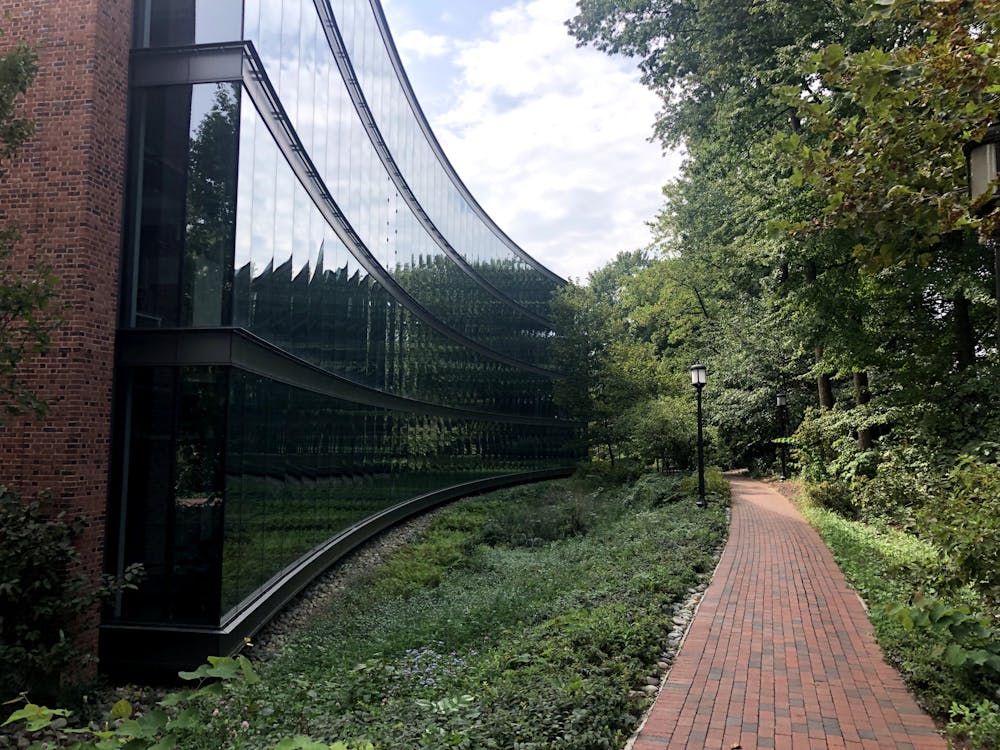While all students are facing challenges adapting to a virtual semester, freshmen are in the unique position of adjusting to a new school without being there in person.
Freshman Shourya Arashanapalli finds that social media are effective in shaping an online Hopkins community.
“I’ll follow a couple people from Hopkins [on Instagram], and the next thing you know, every single story on my feed is Hopkins,” he said. “I just forget that I’m in Atlanta.”
Freshman Chisom Uwakwe uses platforms such as GroupMe and Discord to grow more familiar with other students. She also praised the University for creating social events such as Zoom Outdoors.
University events and initiatives such as Hop-A-Palooza, the virtual Student Involvement Fair (SIF), CampusGroups and trivia nights substitute for in-person community-building activities.
However, with so many possible events, freshman Yuteng Wang reported feeling overwhelmed by the number of virtual programming options.
“It can be exhausting trying to keep up with all the events,” he said. “There’s so much going on at once. Having to make appointments... in order to go to certain events is difficult, whereas in person, I could just walk in.”
Extracurricular Involvement
Following virtual SIF, freshmen have been getting involved with various student organizations. Like classes, clubs cannot meet in person, which poses more challenges to some organizations than others.
Arashanapalli has had a relatively positive experience with his clubs, which he said are not too affected by going virtual. This semester, he has joined the Hopkins Undergraduate Research Journal and The Triple Helix.
“They’re both research journals. I’m really into writing,” he said. “I was a creative writer in school, and I did political cartoons for the school paper.”
On the other hand, freshmen Ashley Lee and Tong Wu noted that their club Musicare, a service-based club that performs at nursing homes and hospitals, is having a much harder time transitioning online.
“I have a feeling we’re not going to be able to do much this semester,” Wu said.
Wang is a member of Korean Pop Motion, a K-pop dance group. He states that although the club is still trying to adapt to going virtual, it is going to be difficult to collaborate.
Online Courses
While many freshmen have already experienced remote learning during their last semester of high school, the transition to college is bringing new challenges.
Lee feels more pressure in virtual college classes than she did as a senior in high school.
“[At my high school] the policy was that in the fourth quarter, your grades couldn’t drop, so it was a lot more flexible, and there was a lot more freedom,” Lee said. “Now I’ve had to rely more on a planner and practice journal to help me keep on top of my work.”
Wang reported that while his workload is manageable, it is harder to focus and stay motivated due to the lack of change in scenery. Studying online, he said, makes him feel like he is going through the same perpetual motions.
Wu, facing a similar problem, moved out of his parent’s home and went to live with his aunt. At his aunt’s, there are fewer distractions, and he has the ability to study alone when his aunt is working during the day.
Uwakwe’s biggest struggle is that the content load is much denser compared to high school, and some of her harder classes, such as chemistry and calculus, are asynchronous.
“If I’m stuck on something, I have to text someone and wait for a response. If I were on campus, I’d get an answer right away,” she said.
Uwakwe highlighted her appreciation for her professors and teaching assistants, who are willing to help and are easy to reach.
Freshman Valeria Leal also emphasized that her professors have strived to make the most out of the current situation. Since she lives in another time zone, they have made many accommodations for her, she said, such as making their office hours at a reasonable time and granting extensions for work.
As an international student living with a 12-hour time difference in Fuzhou, China, Wu is especially grateful for his supportive professors.
“If you don’t want to go to Zoom meetings at night, you can watch recordings, and you’ll be able to catch up,” he said.
Arashanapalli finds the workload to be quickly increasing as the semester progresses.
“I expected it to be really, really awful, and it was innocently good in the first week, but then I realized no, I was wrong. I’m just crossing my fingers,” he said.
Potential Improvements
Although students feel that the University has been very accommodating in providing students opportunities to try new things and explore their interests, freshmen have several suggestions as to how the University can improve their online learning experience.
Wang suggested that the University better equip professors to handle internet troubleshooting.
“There are a lot of technical issues,” he said. “When my professor gets kicked out of their Zooms because their wifi crashes, it’s awkward because you’re just sitting in a 100-person lobby waiting for the teacher to get back.”
Arashanapalli hopes that the University will find a way to relay information faster to the students.
“The University has created a lot of opportunities for us to try new things like the SIF, but I wish they would’ve helped guide us through making those choices. It’s important for freshmen to have information quickly so they can begin to plan,” he said.
Although the initial move to a virtual setting was disappointing, Leal remains optimistic about the remainder of the remote semester and is looking forward to eventually moving to an in-person format.
“It’s been hard, but I think it’s going to be worth it,” she said. “It’s going to be more worth it when we get to go to campus.”





